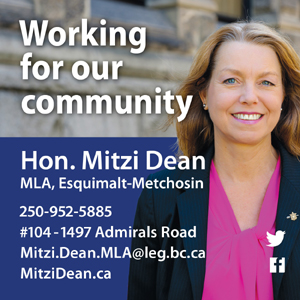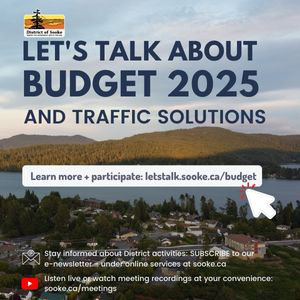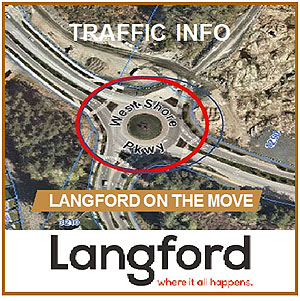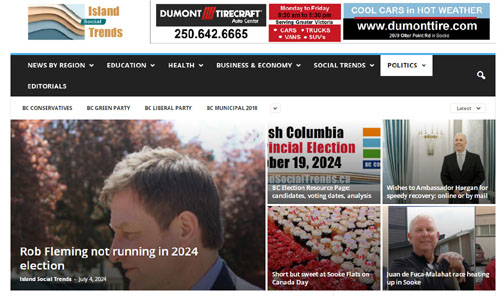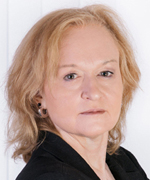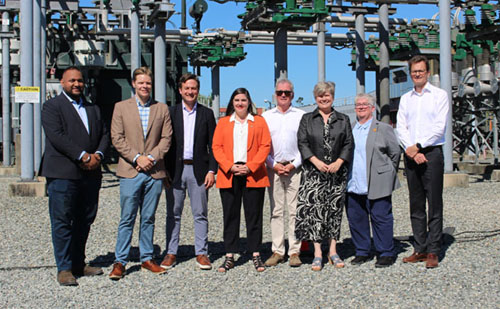
Friday July 5, 2024 | VICTORIA, BC [Updated July 6, 2024]
by Mary P Brooke | Island Social Trends
Pushed by the sheer force of population growth along with housing development in Langford — together with a growing homeowner interest in the use of heat pumps — the timeline has been moved up by BC Hydro to get a new substation operating in the west shore.
Announced outdoors at the Horsey Substation in downtown Victoria on this hot sunny Friday, the new infrastructure to deliver electricity more reliably to a growing number of homes in Langford is expected to have design underway by the end of this year.
Construction would start in 2025 and the station would be in service by 2030, said BC Hydro President Chris O’Riley today.
O’Riley emphasized that electricity needs to be affordable and reliable.
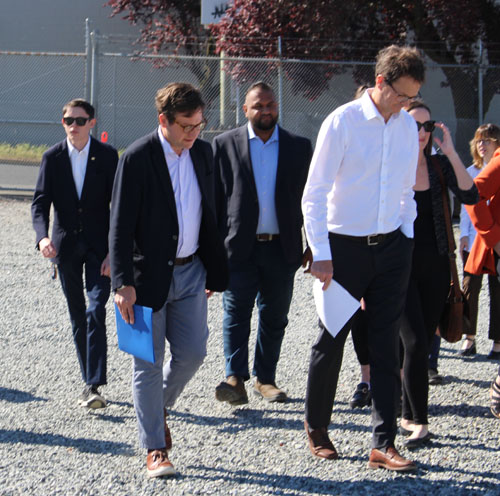
Fast-growing BC population needs more electricity:
Today’s announcement about the new Langford substation will be part of a $3.2 billion capital expenditure for BC Hydro infrastructure around Vancouver Island to maintain, upgrade and expand electrical infrastructure.
This includes dozens of projects to replacement end of life transmission equipment, underground cables that service Victoria, Esquimalt and Saanich, and then extend from the Horsey sbstation – to increase capacity in the area by over 60%, said O’Riley. “That enough to power another 100,000 homes. These projects will be in service in series by 2028,” said O’Riley.
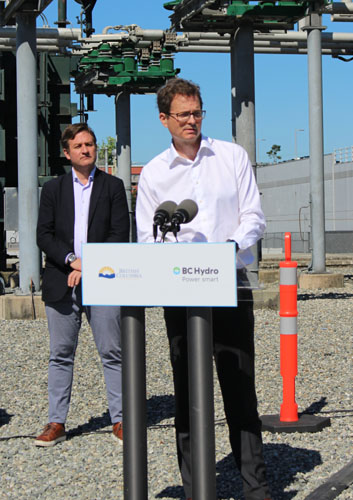
A number of projects are part of the utility’s 10-year capital plan with a price tag of $36 billion province-wide (it’s a 50% increase over BC Hydro’s previous capital plan).
The underground infrastructure for Victoria, Esquimalt and Saanich will be expanded as well.
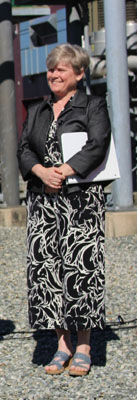
The new Langford substation will service an additional 40,000 to 70,000 new homes by 2030. The City of Langford’s population is expected to double over the next 20 years, noted O’Riley, from the current 50,000 up to 100,000 by 2046. The Langford substation will be the second largest in the CRD region.
In just the first quarter (first three months) of 2024 there were over nearly 37,000 new residents in BC, which Premier David Eby encapsulates to media as 10,000 more people every 37 days. The population of BC is now about 5.7 million.
Vancouver Island is experiencing significant growth in Victoria, Saanich, Langford, Colwood and Nanaimo, as pointed out by key speakers at today’s announcement, including Minister of Transportation and Infrastructure Rob Fleming, Minister of Energy, Mines and Low Carbon Innovation Josie Osborne, and BC Hydro President & CEO Chris O’Riley.
City of Victoria Mayor Marianne Alto also emphasized how her city has a significant commitment to addressing the impacts of climate change while the city experiences “extraordinary growth”. She hopes that today’s youth will help recover the environment for their long-term lives in the City of Victoria.

Increased demand and call for power:
A 15% electricity demand increase is expected by 2030 said Osborne today. “That’s why the call for power that came out this spring is so important,” she told media today.
That will add about 3,000 GWH of energy into the electrical system, which O’Riley hopes will be supplied with renewal resources (wind and solar). The bids for that are expected in September, said O’Riley. Contracts will be extended in December after an evaluation period, he added.
Osborne mentioned Site C in that context, which is coming online this year (we note the political subtext of that going back well over 10 years, with construction having started in 2015 under the previous government).
Heat pumps part of the mix:
“Vancouver Island is a leader on the adoption of heat pumps and we’re seeing that and expecting that to continue to grow. It’s a great product in particular for south Vancouver Island,” said O’Riley.
“Both of those things coming together are driving the need for investment, and that’s what we’re all about,” said BC Hydro’s president regarding population and heat pumps pushing the need for more power, which Osborne emphasized is clean energy.
The Langford substation:
“We have accelerated the development of the Langford substation. We’re in the process of obtaining the site for that, and we’re going to get going on the detailed plans and construction next year,” said O’Riley.
The Langford substation will be the second-largest in the region, said O’Riley today.
“There’s really two drivers for the need for power,” the BC Hydro president told media at the outdoor announcement today in Victoria.
“One is the growing population — Langford’s a particular concentration of new homes. We’re also seeing Vancouver Island has always been an early adopter of heat pumps. We have a higher penetration of heat pumps on the island than anywhere in the province. That was traditionally because there wasn’t as much natural gas readily available here,” O’Riley said.
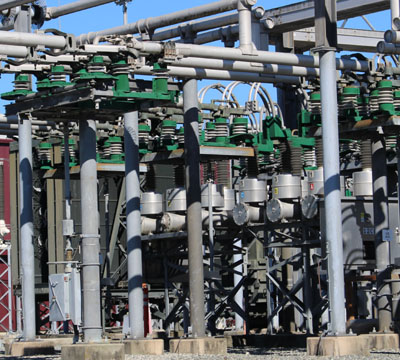
Local MLA Ravi Parmar (Langford-Juan de Fuca) told Island Social Trends today that a few sites are being looked at in the Langford area for the new substation.
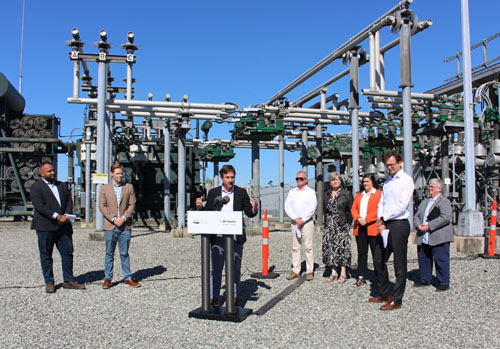
“They’re trying to find the right fit. It’s a pretty significant undertaking,” said Parmar, including the underground work and the infrastructure to deliver power to 40,000 to 70,000 homes in the Langford area. He notes that already homeowners in the Westhills area of Langford are installing solar panels; he referenced more solar panel programs being launched and the heat pump grant funding as announced by Minister Osborne.
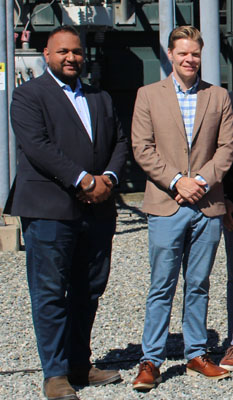
“This provides certainty to the business community and the development community not just in Langford but the entire west shore area,” said Parmar today.
“As we continue to build there will still be an ability to provide this renewable energy, so it’s good news!,” he told Island Social Trends.
Finding the right Langford spot:
The Langford substation will need to be close to the existing lines. “We’ll need a decent area — 30 acres — that’s a big chunk of land,” says O’Riley. BC Hydro will need “a certain type of ground” for the substation; if there’s a fault then the power dissipates,” O’Riley told Island Social Trends today. “If it’s too rocky, that would be a challenge, for example.”
BC Hydro does have a few sites in mind but needs to narrow that down to a final location.
A substation takes power from the big lines and fans it out to the communities. “So we need to be able to put duct banks in. We’ll want to put it relatively close to where the customers are going to use the power, and have access to major roads as the lines typically go down the roads,” O’Riley explained.
“We’re sensitive to how it fits into the neighbourhood,” says BC Hydro’s president. “So put all that together — it’s harder than you might expect to find a spot.”
“The whole area is a seismic zone, so we have to deal with that wherever. It’s the worst seismic zone in the country.” So that consideration is “baked in” to any project that BC Hydro undertakes, says BC Hydro’s president.
There is already one BC Hydro substation in Langford, well in sight in the parking lot area of Westshore Town Centre at Jacklin Road and Langford Parkway. If that one were to be decommissioned (as a new one comes on stream) it would not be missed on the visual landscape, as at least one long-time local politician has said.
BC Hydro projects on South Vancouver Island:
The Horsey Substation where today’s announcement was held “will be the hub of our investments on Vancouver Island and emblematic of the work we’re doing to grow and maintain our system to support a bigger future for electrification,” said O’Riley. He noted industrial growth at Ogden Point and Rock Bay, Swartz Bay and Sandown. That is driving the demand for more clean electricity.
To meet growth in the fastest-growing municipal areas here on south Vancouver Island (Victoria, Saanich, Langford, Colwood and Nanaimo), BC Hydro is investing in several projects as part of its 10-Year Capital Plan, including:
- building a new substation in the Langford area that will power an additional 40,000 to 70,000 homes and be in service by 2030;
- replacing end-of-life transmission underground cables that service Victoria, Esquimalt and Saanich, increasing capacity more than 60%, enough to power more than 100,000 additional homes;
- major distribution investments (like voltage conversion) to increase power-line capacity to support new residential housing and anticipated residential load growth in: Bear Mountain and Langford Heights; Victoria, Oak Bay and Esquimalt; District of Saanich and central Saanich; and North and South Nanaimo;
- upgrades of transmission capacity to Vancouver Island by replacing old undersea cables with new cables by the Gulf Islands; and
- seismic upgrade projects to BC Hydro’s three dams within the Campbell River system – John Hart, Strathcona and Ladore – to maintain downstream public safety and to ensure a continuing reliable local supply of energy, with all three projects planned to be in service by 2030.
Today O’Riley said he hopes to see more wind and solar power generation by Independent Power Producers (IPPs) on Vancouver Island.
He said that utility-scale batteries would be installed on Vancouver Island to provide additional capacity and reliability.
Energy transition:
“We are in the midst of an energy transition,” said BC Hydro’s president & CEO. “It’s very significant for society as well as for electric companies like BC Hydro as more and more people switch from fossil fuels to clean renewable electricity,” O’Riley said.
Jobs and economy:
As emcee today, Fleming said the the new substation in Langford and the other BC Hydro projects will generate jobs and will support people in businesses as the transition to a clean energy economy continues.
“Communities all over Vancouver Island are growing fast,” said Minister Osborne. The population growth and significant housing development is attracting “new clean industries” and “we’re seeing existing businesses continue to expand their operations”, she said today.
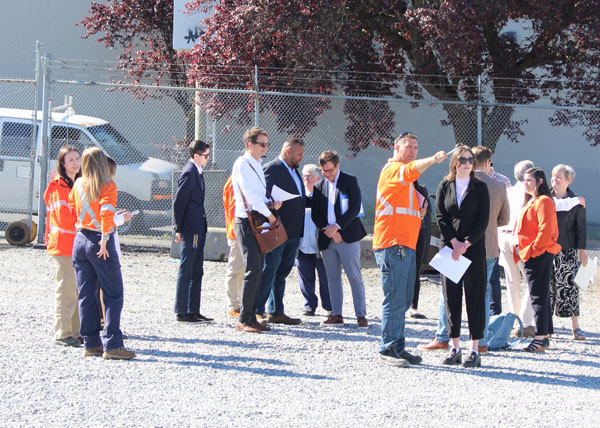
“People are making the switch to electric vehicles and their installing heat pumps in record numbers,” said Osborne. We need to make sure we’re ready to meet the growing demand for clean power and that we get the power to the places where it’s needed and when it’s needed.”
Maintaining and increase capital investments to maintain capital investments will mean thousands of high-quality jobs for skilled workers — about 10,500 to 12,500 every year throughout the province over the next decade, said Osborne. “Powering up our economy with clean electricity is truly the job creation opportunity of this generation.” [See Powering Our Future: BC’s Clean Energy Strategy, as released in June 2024]. She wants to see the cost of electricity “remain affordable”.
Victoria Chamber of Commerce President Bruce Williams today said the chamber is “at the forefront of the desire for climate action leadership and we’re a loud voice in that conversation”. “We want to continue enjoying the best climate in Canada and one of the most favourable climates on planet Earth,” said Williams. Resilience of the power grid “will ensure our region has sustainable access to clean energy,” said Williams. “Jobs and sustainable growth” are key to the local economy, he said.
===== RELATED:
- BC Hydro 2024 call for power including wind and solar (April 3, 2024)
- BC Hydro aiming for 2030 energy demand target (June 16, 2023)
- BC Hydro pole relocation pushes Starlight Stadium to 2024 for expanded sports season (June 20, 2022)
- NEWS SECTIONS: BUSINESS & ECONOMY | VANCOUVER ISLAND | LANGFORD
===== ABOUT THE WRITER:
Mary P Brooke is the editor of Island Social Trends, a publication she launched in 2020 to explore the socioeconomic and political dynamics of the south Vancouver Island region, BC politics, and national issues.
Island Social Trends publishes daily at IslandSocialTrends.ca and bi-weekly in print. Premium Subscribers may purchase the PDF version of the print edition, which is delivered by email (as well as breaking news by text message).
Relocating from Oak Bay, Ms Brooke lived in Sooke for 10 years, where she launched MapleLine Magazine (2008-2010) and then the weekly printed newspaper Sooke Voice News (2011-2013). During 2014-2020 she launched and ran West Shore Voice News, then moving to Langford in 2017.
When the pandemic hit in 2020, Ms Brooke shifted to posting her regional socioeconomic news insights and political analysis daily at IslandSocialTrends.ca and wrote extensively about the pandemic for a provincial audience. She now reports on provincial news issues alongside the BC Legislative Press Gallery.
The Island Social Trends print edition is back up and running on a bi-weekly basis. Subscribers welcome (individual, small teams, corporate).



